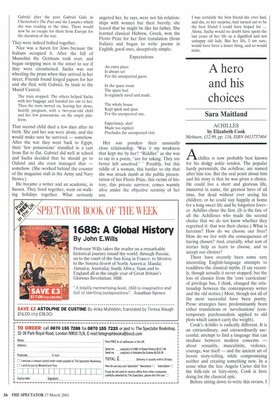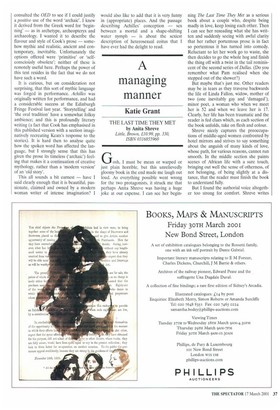A hero and his choices
Sara Maitland
ACHILLES by Elizabeth Cook Methuen, £12.99, pp. 116, ISBN 0413757404 Achilles is now probably best known for his dodgy ankle tendon. The popular hardy perennials, the achilleae, are named after him too. But the real point about him and his story is that he was given a choice. He could live a short and glorious life, immortal in name, the greatest hero of all time, but dead without ever seeing his children; or he could stay happily at home for a long sweet life and be forgotten forever. Achilles chose the first. (It is the fate of all the Achilleses who made the second choice that we do not know whether they regretted it: that was their choice.) What is heroism? How do we choose our lives? How do we live with the consequences of having chosen? And, crucially, what sort of stories help us learn to choose, and to accept our choices?
There have recently been some very interesting English-language attempts to readdress the classical myths. (I say recently, though actually it never stopped, but the loss of classics from the 'core curriculum' of privilege has, I think, changed the relationship between the contemporary writer and the old stories.) Most, though not all of the most successful have been poetry. Prose strategies have predominantly been either translations or `novelisations' (contemporary psychoanalysis applied to old plots which cannot carry the weight).
Cook's Achilles is radically different. It is an extraordinary, and extraordinarily successful, attempt to find a language that can mediate between modern concerns — about sexuality, masculinity, violence, courage, war itself— and the ancient art of heroic story-telling, while compromising neither and creating something new. In a sense what the late Angela Carter did for the folk-tale or faity-story, Cook is here doing for the classical epic.
Before sitting down to write this review, I
consulted the OED to see if I could justify a positive use of the word 'archaic'. I knew it derived from the Greek word for 'beginning' — as in archetype, archeopteryx and archaeology. I wanted it to describe the flavour and style of Cook's prose — somehow mythic and realistic, ancient and contemporary, inevitable. Unfortunately the options_ offered were 'primitive' or 'selfconsciously obsolete'; neither of these is remotely useful here. Perhaps the power of this text resides in the fact that we do not have such a word.
It is curious, but on consideration not surprising, that this sort of mythic language was forged in performance. Achilles was originally written for performance, and had a considerable success at the Edinburgh Fringe Festival last year. 'Storytelling' and 'the oral tradition' have a somewhat folksy ambience; and this is profoundly literary writing (a fact that Cook has emphasised in this published version with a section imaginatively recreating Keats's response to the stories). It is hard then to analyse quite how the spoken word has affected the language, but I strongly sense that this has given the prose its timeless (archaic') feeling that makes it a continuation of creative mythology, rather than a 'modern version' of an 'old story'.
This all sounds a bit earnest — have I said clearly enough that it is beautiful, passionate, claimed and owned by a modern woman writer of intense imagination? I would also like to add that it is very funny in (appropriate) places. And the passage describing Achilles' conception — sex between a mortal and a shape-shifting water nymph — is about the sexiest description of heterosexual coitus that I have ever had the delight to read.



































































 Previous page
Previous page